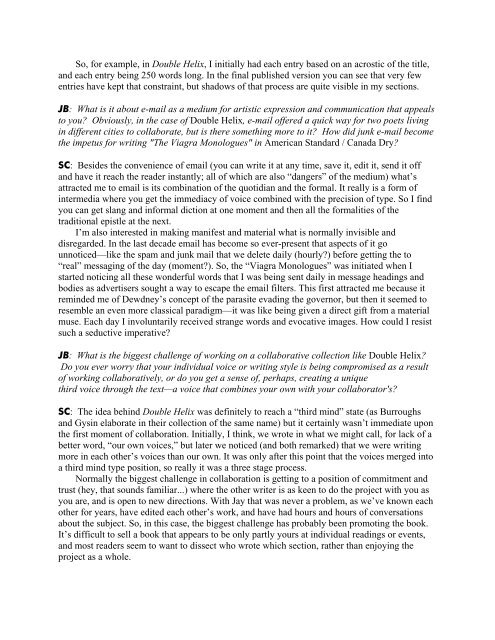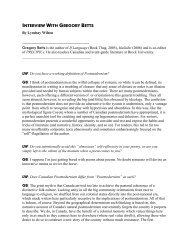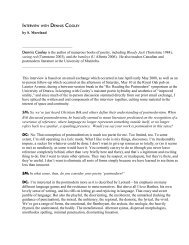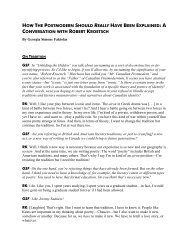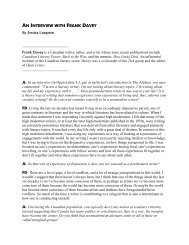Contemporary Postmodern Avant-Garde - The Canadian Literature ...
Contemporary Postmodern Avant-Garde - The Canadian Literature ...
Contemporary Postmodern Avant-Garde - The Canadian Literature ...
You also want an ePaper? Increase the reach of your titles
YUMPU automatically turns print PDFs into web optimized ePapers that Google loves.
So, for example, in Double Helix, I initially had each entry based on an acrostic of the title,<br />
and each entry being 250 words long. In the final published version you can see that very few<br />
entries have kept that constraint, but shadows of that process are quite visible in my sections.<br />
JB: What is it about e-mail as a medium for artistic expression and communication that appeals<br />
to you? Obviously, in the case of Double Helix, e-mail offered a quick way for two poets living<br />
in different cities to collaborate, but is there something more to it? How did junk e-mail become<br />
the impetus for writing "<strong>The</strong> Viagra Monologues" in American Standard / Canada Dry?<br />
SC: Besides the convenience of email (you can write it at any time, save it, edit it, send it off<br />
and have it reach the reader instantly; all of which are also “dangers” of the medium) what’s<br />
attracted me to email is its combination of the quotidian and the formal. It really is a form of<br />
intermedia where you get the immediacy of voice combined with the precision of type. So I find<br />
you can get slang and informal diction at one moment and then all the formalities of the<br />
traditional epistle at the next.<br />
I’m also interested in making manifest and material what is normally invisible and<br />
disregarded. In the last decade email has become so ever-present that aspects of it go<br />
unnoticed—like the spam and junk mail that we delete daily (hourly?) before getting the to<br />
“real” messaging of the day (moment?). So, the “Viagra Monologues” was initiated when I<br />
started noticing all these wonderful words that I was being sent daily in message headings and<br />
bodies as advertisers sought a way to escape the email filters. This first attracted me because it<br />
reminded me of Dewdney’s concept of the parasite evading the governor, but then it seemed to<br />
resemble an even more classical paradigm—it was like being given a direct gift from a material<br />
muse. Each day I involuntarily received strange words and evocative images. How could I resist<br />
such a seductive imperative?<br />
JB: What is the biggest challenge of working on a collaborative collection like Double Helix?<br />
Do you ever worry that your individual voice or writing style is being compromised as a result<br />
of working collaboratively, or do you get a sense of, perhaps, creating a unique<br />
third voice through the text—a voice that combines your own with your collaborator's?<br />
SC: <strong>The</strong> idea behind Double Helix was definitely to reach a “third mind” state (as Burroughs<br />
and Gysin elaborate in their collection of the same name) but it certainly wasn’t immediate upon<br />
the first moment of collaboration. Initially, I think, we wrote in what we might call, for lack of a<br />
better word, “our own voices,” but later we noticed (and both remarked) that we were writing<br />
more in each other’s voices than our own. It was only after this point that the voices merged into<br />
a third mind type position, so really it was a three stage process.<br />
Normally the biggest challenge in collaboration is getting to a position of commitment and<br />
trust (hey, that sounds familiar...) where the other writer is as keen to do the project with you as<br />
you are, and is open to new directions. With Jay that was never a problem, as we’ve known each<br />
other for years, have edited each other’s work, and have had hours and hours of conversations<br />
about the subject. So, in this case, the biggest challenge has probably been promoting the book.<br />
It’s difficult to sell a book that appears to be only partly yours at individual readings or events,<br />
and most readers seem to want to dissect who wrote which section, rather than enjoying the<br />
project as a whole.


